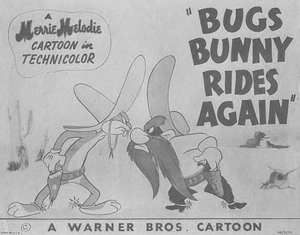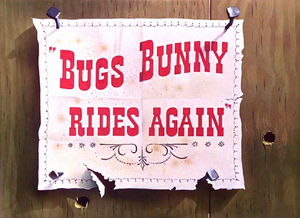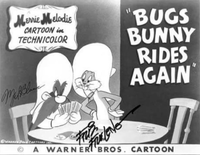Bugs Bunny Rides Again
| Bugs Bunny Rides Again | |
|---|---|
 Lobby card. | |
| Production company | Warner Bros. Cartoons |
| Distributor | Warner Bros. Pictures The Vitaphone Corporation |
| Release date | June 12, 1948 |
| Starring | Mel Blanc Robert C. Bruce Michael Maltese Tedd Pierce |
| Producer(s) | Edward Selzer |
| Music composition | Carl Stalling |
| Story | Tedd Pierce Michael Maltese |
| Animation | Ken Champin Virgil Ross Gerry Chiniquy Manuel Perez |
| Director(s) | I. Freleng |
| Series navigation | |
| ← Previous | Next → |
| Title card | |

| |
Bugs Bunny Rides Again is the two hundred and eighty-eighth Merrie Melodies theatrical short. It was distributed by Warner Bros. Pictures and The Vitaphone Corporation on June 12, 1948. It was written by Tedd Pierce and Michael Maltese, produced by Edward Selzer, and directed by Friz Freleng.
In the old western town of Rising Gorge, Yosemite Sam is pitted against Bugs Bunny.
Detailed Summary
Memorable Quotes
Cowboy #1: Yosemite Sam!
Cowboy #2: It's Yosemite Sam!!
Sam: Yeah, Yosemite Sam. The roughest, toughest he-man stuffest hombre that's ever crossed the Rio Grande, and I ain't no namby pamby!
Skunk: My, weren't there a lot of skunks in here?
Sam: Now, be there any living varmint as aims to try to tame me? Well, be there?!
Bugs: I aims to...
Bugs: So long, Sammy! See you in Miami!
Characters
In order of appearance: | ||||||||||||
| ||||||||||||
Locations
- Earth
- United States
- Rising Gorge
- Gunshot Saloon
- Train station
- Rio Grande (mentioned)
- Florida (indirectly mentioned)
- Miami (mentioned)
- Rising Gorge
- United States
Objects
- Yosemite Sam's revolvers
- Six shooter guns
- Seven shooter guns
- Eight shooter guns
- Nine shooter guns
- Ten shooter guns
- "Pea shooter" straw
- Flying bullets
- Stoplight
Production

Development
Music
The music was composed by Carl W. Stalling.
Samples of classical music are prominently used in this short, which include the following:[1]
- Finale of the "William Tell Overture" by Gioachino Rossini - the opening titles and horse chase scene between Bugs Bunny and Yosemite Sam
- "Cheyenne" by Egbert Van Alstyne and Harry Williams - the establishing shot of Rising Gorge, and Bugs' rush towards the train station
- Erlkönig by Franz Schubert - Yosemite Sam's introduction
- Inflammatus et accensus by Gioachino Rossini - Bugs and Sam's gun duel
- Sonata Pathétique by Ludwig van Beethoven - "This town ain't big enough" scene
- Act III prelude of Siegfried by Richard Wagner - Sam's rage following his fall
Additionally, a number of cues by Stalling and other artists are used in the short:[1]
- "Yosemite Sam" by Carl W. Stalling - plays when Bugs Bunny emerges to confront Sam
- "Untitled Soft-Shoe Number" by Carl W. Stalling - during Bugs' vaudvillian dance number; also the same cue used in Stage Door Cartoon
- "Fighting Words" by Carl W. Stalling - Bugs and Sam exiting the town
- "The Loser" by Carl W. Stalling - Bugs and Sam's agreement of a card game
- "My Little Buckaroo" by M.K. Jerome and Jack Scholl - the card game scene
- "Oh, You Beautiful Doll" by Nat Ayer and Seymour Brown - beautiful women at the Miami Special
- "Aloha ʻOe" by Liliʻuokalani - the train's departue
Release
Dates are in order of release:
- United States: June 12, 1948 in theatres
Behind the scenes
- The title is a pun on the many phrases that use the "Rides Again" phrase, such as "The Lone Ranger rides again." It also suggests a reference to the 1940 Jack Benny comedy film, Buck Benny Rides Again, which the title may have been inspired from.
- Writers Michael Maltese and Tedd Pierce fill as ad libs for the saloon crowd.[2]
- This is the first cartoon to use the "COLOR BY TECHNICOLOR" tagline instead of "IN TECHNICOLOR." It was shortly changed to "Color by TECHNICOLOR" with the 1948 Looney Tunes cartoon, Haredevil Hare.
Legacy
- The "line crossing" scene was replicated in Invasion of the Bunny Snatchers.
- The Gunshot Saloon would be used as the world maps' toon building in Looney Tunes: World of Mayhem.
Home availability
- In the United States: